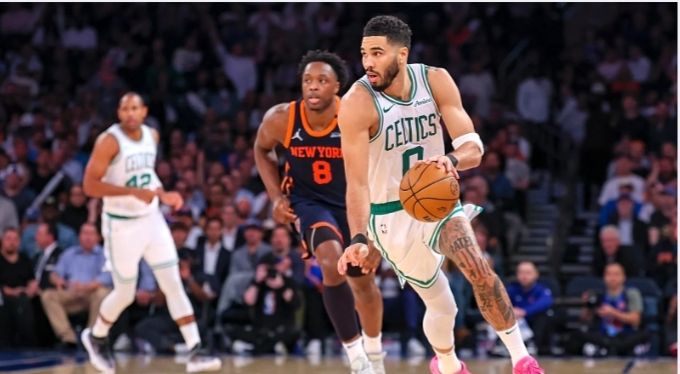Watching the latest NBA power rankings roll out after a dominant season by the Boston Celtics leaves fans and analysts alike shaking their heads. How can a team that won 61 games, secured the top spot in the Eastern Conference, posted one of the highest net ratings in the league, and consistently played elite basketball on both ends of the floor still be treated as anything less than a top-tier championship contender? The Celtics didn’t just have a good season—they had one of the most balanced and effective seasons of any team in recent memory. Yet despite all this, they continue to be overlooked or ranked behind teams with worse records, weaker rosters, or flashier narratives. It’s more than just an oversight—it’s outright disrespect.
The Celtics’ 61-21 record speaks volumes. Not only did they finish with the best record in the East, but they did it with efficiency and consistency. Throughout the season, they maintained a top-five ranking in both offensive and defensive ratings—an extremely rare and impressive feat. Only a select few teams in the modern era have managed to sustain that kind of excellence on both ends of the floor over an 82-game season. That’s the hallmark of a legitimate title threat. And yet, the Celtics were often ranked behind teams like Cleveland or Oklahoma City, even when Boston had a better win-loss record and stronger statistical profile. This isn’t just about numbers—it’s about a pattern of media outlets and analysts underrating what the Celtics accomplish on the court.
Roster-wise, the Celtics were arguably the most talented and deepest team in the NBA. Their starting lineup featured Jayson Tatum, Jaylen Brown, Kristaps Porzingis, Jrue Holiday, and Derrick White—a group packed with All-Stars, elite defenders, high-IQ playmakers, and reliable scorers. That core five was a nightmare matchup for any team, with each player capable of taking over a game or making a key defensive stop. And when it came to depth, the Celtics had Payton Pritchard coming off the bench, who provided a crucial scoring spark and even won Sixth Man of the Year. Boston’s rotation wasn’t just solid—it was lethal. Yet somehow, when national rankings were released, this all seemed to be brushed aside in favor of flashier, more dramatic storylines from other franchises.
So why were the Celtics constantly disrespected? One reason could be the timing and short-term memory of many media outlets. Power rankings often overvalue what happened in the past week or two rather than the totality of the season. A team like Boston, which may have dropped a game to a lower-seeded opponent or sat players for rest during a back-to-back, could quickly fall in the rankings. Meanwhile, another team that went on a short winning streak or upset a top opponent might suddenly skyrocket to the top. That reactive mindset is fundamentally flawed. It rewards inconsistency and undervalues the steady dominance that teams like the Celtics display over time.
Another factor in the disrespect is injury narratives. When Kristaps Porzingis or Jayson Tatum missed time, rankings were quick to drop Boston without considering the depth and resilience of the rest of the roster. And when Tatum suffered a season-ending Achilles injury, some outlets used it as an excuse to drop Boston far down in early previews for the next season. While injuries certainly matter, Boston had proven all year that they were more than just one or two players. The collective talent, system, and coaching excellence were more than enough to keep them competitive. Still, instead of acknowledging that, many analysts chose to project collapse.
Bias in coverage also plays a major role. Certain franchises are media darlings—teams like the Knicks, Lakers, or Warriors often benefit from being in larger markets or having historic legacies that influence coverage. This often results in rankings that lean into hype and nostalgia rather than focusing purely on performance. Boston, despite being one of the most storied franchises in NBA history, seems to fall into a strange gray area. They’re respected historically, but modern iterations of the team don’t always get the recognition they deserve. When other teams make noise or rack up highlight plays, they’re rewarded with higher rankings. When Boston wins methodically and with discipline, the media shrugs.
It’s not just media outlets that show this trend. Even some fans outside of Boston echo these sentiments, perpetuating the idea that the Celtics are somehow less exciting or not as legitimate. But the truth is that Boston plays high-level basketball, rooted in strategy, teamwork, and execution. They don’t rely solely on one player putting up 50 points or making viral plays. Their success is collective, and perhaps that’s why it goes underappreciated in an era that celebrates individualism.
The disrespect becomes even more frustrating when you look at the Celtics’ historical consistency over the past several seasons. They’ve made deep playoff runs, appeared in multiple conference finals, and have been a top-tier team in the East for years. Yet every time they lose a key game or stumble in the playoffs, the narrative shifts to one of failure or collapse, as if they’ve never accomplished anything. Other teams can fall short and still be praised for their potential, but when Boston doesn’t win it all, they’re labeled as chokers or overrated. That double standard is exhausting for fans and unfair to the players and coaching staff.
Coaching should also factor into these evaluations, and Joe Mazzulla has done a commendable job leading this team. He managed personalities, adjusted rotations effectively, and navigated injuries and tough matchups with composure. Yet even in discussions about coaching, he is often left out of conversations in favor of more media-hyped names. That reflects the larger issue—the Celtics are judged differently. Their excellence is seen as expected, so it’s rarely celebrated.
What makes the disrespect worse is that it creates an ongoing cycle. Lower rankings influence national conversations, which in turn shape narratives and public perception. That impacts award voting, media coverage, and even how players are discussed in historical context. When Jayson Tatum is left off MVP ballots or Jaylen Brown isn’t recognized for his two-way impact, it’s not just about numbers—it’s about how those numbers are interpreted. And unfortunately, those interpretations are skewed when a team like Boston is consistently undervalued in rankings.
Even heading into the next season, early projections have Boston falling behind teams like Cleveland, New York, or even Miami—teams with far less proven track records and weaker statistical resumes. Those kinds of projections ignore the infrastructure and winning culture that Boston has built. They have the front office stability, coaching foundation, and player development success that most franchises envy. Yet, because of one injury or one playoff loss, all that gets dismissed.
The Celtics don’t need media validation to win. But the players, coaches, and fans certainly deserve recognition for what they’ve built. The team has consistently shown that they can beat anyone on any given night. They have the talent, depth, strategy, and heart to go toe-to-toe with the best in the league. Rankings should reflect that—not be swayed by hype, market size, or short-term streaks.
In the end, power rankings are just opinions. But when those opinions shape larger narratives and influence how a team is viewed on the national stage, they matter more than they should. And right now, the Boston Celtics are being unfairly pushed aside, their excellence dismissed in favor of flashier, less consistent competitors. That’s not just bad analysis—it’s disrespect. Celtics fans have every right to be frustrated, because their team has done everything to earn the top spot, and yet they’re still being treated like they have something to prove. When the dust settles, and the playoffs begin, Boston will once again let their play do the talking. But until then, the rankings remain a glaring example of how even excellence isn’t always enough to get the respect you deserve.



